One need only say “Tibet” for most people to immediately think of Buddhism. In fact, Tibetans regard themselves as practitioners of the purest Buddhadharma, since their lineages and teachings have been preserved by their geographical isolation, protected by the Himalayan ranges for centuries. Keeping the Dharma untainted is not a responsibility that the Tibetans take lightly; those who rule the country are received as divine sentinels of the purest Buddhadharma, viewed with unquestioning faith in a manner that often seems illogical to the secular, Western world.
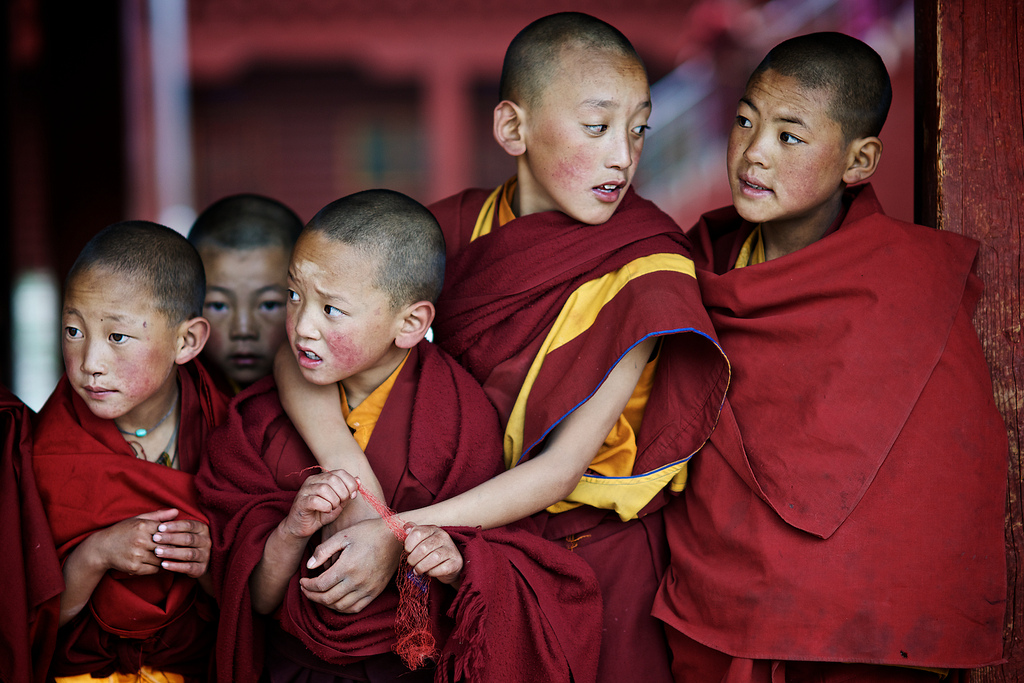
Buddhism is an intrinsic part of Tibetan culture. In the Tibet of old, at least one son in each family would become a monk, considering it an act of honor for the family
Given this background, it is not difficult to understand why Tibetans are always deeply concerned about how Buddhist their actions are. It is also not difficult to see how this concern may historically have been manipulated. The combination of concern and unquestioning faith has allowed a secular and self-serving Tibetan polity to play on the people’s piety and implement decisions without much regard for the welfare of the Tibetan people. Without any accountability, their actions have frequently led to unpleasant consequences.
The manipulation is simple – those in power condemn something as un-Buddhist, thus provoking the ire of the Tibetan population because the act has been deemed to be an insult to the Tibetan identity. In the same way Mao would label something “bourgeois” to incite the Chinese population’s hatred against it, such condemnations from Tibetan politicians are also usually sufficient to see that act banned, whether the ban is legally or socially mandated or even ethically right.
A Justifiable Suicide
Considering their influence over the population, it beggars belief that the Central Tibetan Administration (CTA) has yet to condemn self-immolations as un-Buddhist, to prevent further loss of life. More surprisingly, the CTA even published on their website an article in support of self-immolations, titled “Is self-immolation anti-Buddhist?”
Ex-Prime Minister Samdhong Rinpoche says “We should support all those that have sacrificed their life for the Tibetan cause”, an indirect support for the self-immolations happening in Tibet.
If we were to reword the question into something more encompassing, we could also ask,
Does taking away a life become justifiable because the motivation is to benefit others, even though there is no result?
Whilst its “Buddhist-ness” appears to be debatable, what happens during the actual self-immolation is not – self-immolations usually result in the person’s death, whether immediately or from injuries sustained. Therefore, regardless of the person’s motivation, self-immolations are essentially suicides since the act of dousing oneself with a flammable substance before setting oneself alight is not designed for survival. Therein lies the first reason why self-immolations are definitely un-Buddhist – one of the basic Mahayana vows states that we should refrain from taking any lives, including our own.
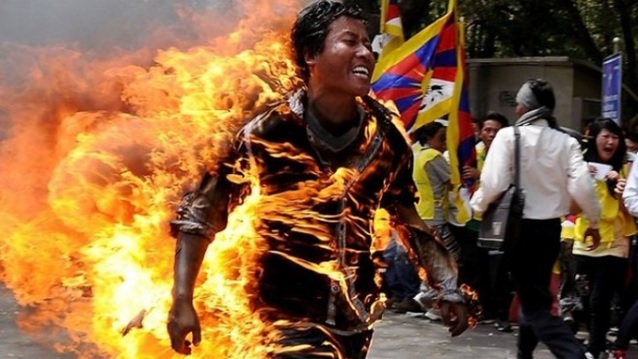
Jampa Yeshi, like so many others before him, did not survive
In his article, the author Tenzin Kun-khyab opined that self-immolations are acceptable and akin to Buddha sacrificing his life for a starving tigress. It would appear that the author considers the attainments of the self-immolators to be equal to that of Buddha when he sacrificed himself for the hungry animal. If so, on what basis does the author perceive these attainments? The English proverb “It takes one to know one” springs to mind – is the author alluding to his own similar attainments, which allows him to perceive those of the self-immolators?
This willful interpretation of the scriptures is worrying, especially when its purpose is to justify the taking of a sentient being’s life and to glorify the unnecessary loss of lives as part of a political strategy which thus far has not proven to be effective. In the case of Tenzin Kun-khyab, the parable has been interpreted in direct contradiction to the original intended moral of the Buddha’s story which was about compassion and non-attachment to one’s physical form. The Buddha never intended the chronicles of his acts of compassion to become justifications and glorifications of suicides.
Tenzin Kun-khyab also likens the self-immolations to the Tibetan defense of their homeland in the 1950s, when monks renounced their vows in order to take up arms against the Chinese. One should remember that the vows were written by Shakyamuni Buddha and designed to train sentient beings towards enlightenment. In renouncing their vows, the monks effectively renounced the teachings Buddha taught for ultimate freedom from suffering, in favor of their involvement in transient geo-political issues. It is therefore worrisome that such an incident is celebrated as a good example of religious faith and significance, when it is quite the opposite.
Self-immolations As A Selfish Act
To determine the second reason why self-immolations are un-Buddhist, consider the result of the Tibetan self-immolations. Since 2009, over 140 people have self immolated and over 120 of these have died in this horrific manner and yet the Chinese government remains unmoved. The Tibetan response to this Chinese wall of silence has been illogical, to say the least – instead of selecting another more effective method, they have instead chosen to remain with the same ineffective method and increase the frequency of the self-immolations in a dramatic show of desperation.
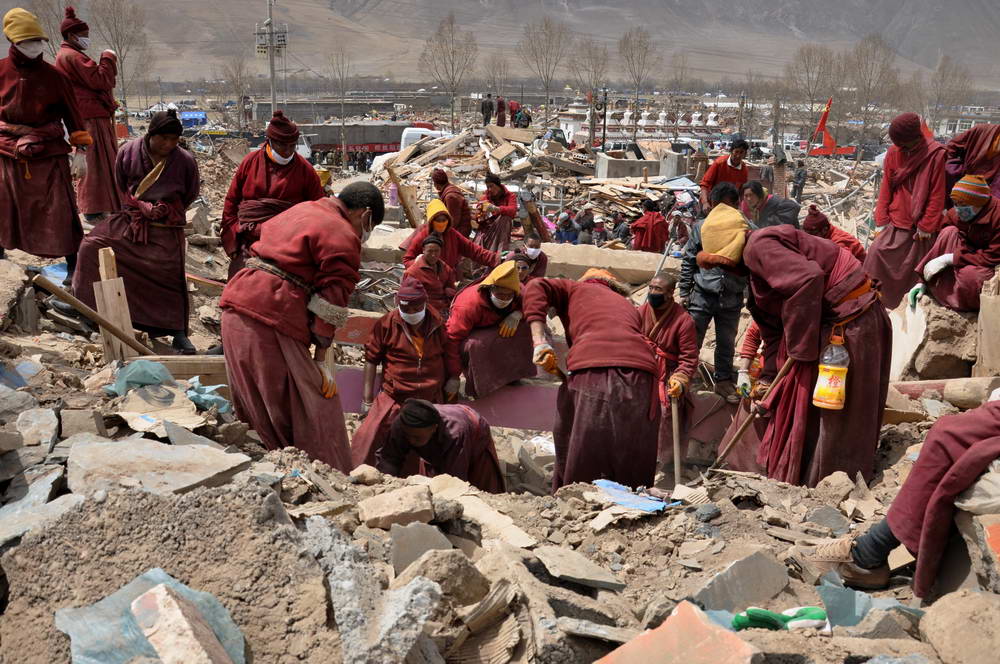
Tibetans monks help Chinese earthquake victims. This is how the world views Tibetans: kind and compassionate towards all sentient beings. The current spate of self-immolations is completely at odds with this image
And yet, despite this increase, the Chinese government remains unresponsive and the international community has remained silent. Compare this to both Vietnam and the Middle East, when the international community acted on the loss of just one life.
It requires the barest of analyses to recognize that self-immolating to raise awareness of the Tibetan plight is an ineffective method. Given the ineffectiveness of the method, any logical individual would consider changing tactics. The Tibetans however, have chosen to remain with the same ineffective strategy. One could therefore reasonably conclude that the Tibetans have failed to adequately evaluate the situation, and what the world is really witnessing is ignorance – that is, ignorance of the situation is leading to their suicides for the greater cause, although it is an act that is both false and foolish because it bears no result at all.
From a Buddhist perspective, ignorance arises from selfishness. Since Tibetan self-immolations arise out of ignorance from lack of proper evaluation, these acts are therefore selfish and contradict the Buddhist aim of increasing one’s compassion and lessening one’s selfishness; in short, when Tibetans self-immolate, it is un-Buddhist.
Silence of the Leadership
To view self-immolations as anything but un-Buddhist would require a very biased interpretation of the scriptures. It is therefore shocking that the CTA, a historically Buddhist government, has allowed on their website an article that defends an un-Buddhist act as a Buddhist one. The CTA’s apparent support for and refusal to prohibit this senseless act shows the self-serving nature of the Tibetan leadership – they will allow their people to die if it suits their purpose.
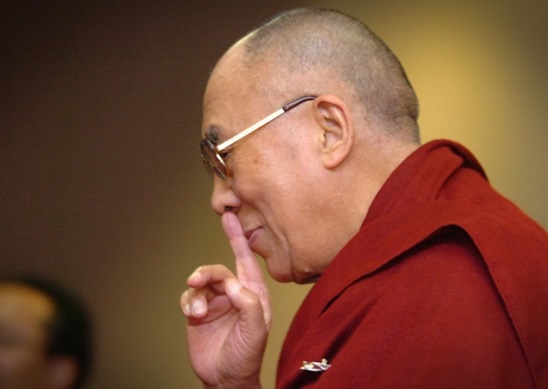
Is the Dalai Lama’s silence intentional?
The CTA aside, the Dalai Lama’s silence on self-immolations has not gone unnoticed. There is only one logical conclusion for this silence, arrived at in reference to the ban on Dorje Shugden. When the Dalai Lama banned the practice of Dorje Shugden, the world was led to question why this monk, the face of compassion, appeared to be instigating religious discrimination. In not condemning the self-immolations, the Dalai Lama has again led the world to ask why this same monk has not spoken out against so many suicides.
Some might claim the Dalai Lama’s silence reflects his loss of control over the Tibetans. For example, in a 2013 interview, Samdhong Rinpoche stated that it is pointless to discourage self-immolations because the Tibetans are growing increasingly desperate. His belief does not appear to be a commonly held one – Tenzin Kun-khyab himself writes that:
It is true that as long as His Holiness the Dalai Lama is alive, Tibetan people will never go against his teachings of non-violence.
Clearly Tenzin Kun-khyab continues to believe in the power of the Dalai Lama’s words and through the Dorje Shugden ban, we already know that Tibetans are still willing to do something illogical just because the Dalai Lama said so.
Therefore, since it is not due to a loss of control, perhaps the Dalai Lama has remained silent in a bid to prepare Tibetans for his eventual passing by lessening their reliance on him and the political elite. Just like how the Dorje Shugden ban revealed the CTA’s hypocrisy and the Tibetan population’s blind faith, perhaps the Dalai Lama is now using his silence on self-immolations to reinforce the same message – think for yourself, and learn to question and contemplate what is around you because that is the only way to guarantee a pleasant future for yourself and others, in this life and beyond.
A Return to Buddhism
All this is a very real possibility that is beyond mere speculation, given what has taken place in the last few years with His Holiness relinquishing secular power and stepping down as leader of Tibet in favor of democratic elections. After all, how can the Dalai Lama not say something – anything – as his people continue to burn to death? In not speaking out against the climbing death toll, the Dalai Lama is setting an example to his followers – he no longer comments on secular issues because Buddhist practice is more important than politics.
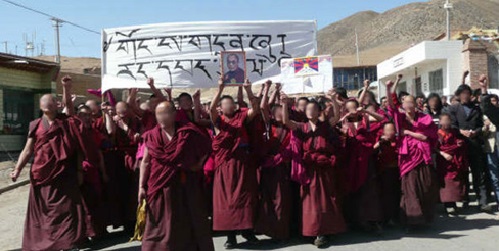
The sight of monks protesting would have been unthinkable just 50 years ago. Is the Dalai Lama trying a different method to get Tibetans to remember their waning Buddhist identity?
Buddhism relies on logic, understanding, contemplation and practice to bring ultimate liberation to ourselves and others. It would appear that the Dalai Lama is trying to introduce these qualities back to his people who have become so caught up in their fight for a free Tibet, they have forgotten what it really means to be Tibetan: they are peace-loving Buddhist people who act in accordance with the laws of karma. In their desperation for independence, this forgotten aspect of their culture has even led their government to attempt to peddle a clearly un-Buddhist act as a righteous one.
It is precisely this kind of thinking that renders Tibetan independence efforts fruitless because when an act begins with an un-Buddhist motivation, it will end with an un-Buddhist result. We are seeing this clearly with self-immolations – with China remaining unmoved, and the Tibetans having no result to show for their self-immolations, logic infers that the motivation of the acts need to be redefined. It is time the Tibetans take some time to reflect on their actions, and to recall what truly made them unique in this world – a spiritual people who understood the foolhardiness of fighting against karma, trying to reclaim a lost memory and homeland that today seems further away than ever.
MORE NEWS LIKE THIS